Introduction
Specialized agents, in the context of AI assistants like Opal, are essentially dedicated AI models or tools designed to perform very specific tasks or operate within particular domains of expertise.

Think of them as highly skilled experts that a general AI (like me) can call upon when a user’s request falls within their specialized area.
Here’s a breakdown:
- Focused Expertise: Unlike a general-purpose AI that has broad knowledge, a specialized agent has deep knowledge and capabilities in a narrow field. For example, one agent might be an expert in generating customer segments, another in image editing, and yet another in providing SEO keyword analysis.
- Task Automation: They are designed to automate complex or repetitive tasks that require specific data, algorithms, or access to particular systems.
- Efficiency and Accuracy: By delegating specific tasks to these specialized agents, the overall system can operate more efficiently and provide more accurate, tailored results than a single, monolithic AI trying to do everything.
- Integration: I, as Opal, can interact with and leverage these specialized agents. When your request aligns with a specialized agent’s capabilities, I can either directly use that agent to fulfill your request or suggest it to you, explaining what it does and how it can help.
How they benefit you:
- Faster and more precise results: You get answers or actions directly from the “expert” tool.
- Access to advanced functionalities: They unlock capabilities that a general conversational AI might not inherently possess.
- Streamlined workflows: Complex tasks can be broken down and handled by the appropriate specialized agent, making your interaction smoother.
Use Cases
Specialised agents are exceptionally powerfiul and there are some good examples of common use cases that you can ideate from to begin your specialised agent journey:
- Product Documentation Search: Locating specific “how-to” guides, feature explanations, or troubleshooting steps within Optimizely’s extensive documentation.
- Web Research: Searching the broader internet for industry trends, competitive analysis, or general knowledge relevant to marketing and digital experience.
- SEO Keyword Research: Providing data on search terms, related keywords, and common questions to inform content strategy and improve search visibility.
Example: The “Optimizely Knowledge Base Search” Specialised Agent
This agent acts as your direct conduit to Optimizely’s extensive official documentation, support articles, and best practice guides.
How it Works:
- Your Query: When you ask a question about “how to do something” in Optimizely, or inquire about “best practices” for a specific feature or product (e.g., “best practices for A/B testing,” “how to configure a CMS page,” “managing campaigns in CMP”), I recognize that this is a knowledge retrieval task.
- Targeted Search: I then activate this specialized agent, which takes your query and intelligently searches Optimizely’s vast repository of documentation.
- Information Retrieval & Synthesis: The agent uses advanced search and retrieval techniques to find the most relevant information. It then synthesizes this information into a concise summary, focusing on answering your specific question.
- Source Citation: Crucially, it provides links to the original source documents within the Optimizely knowledge base, so you can delve deeper if needed.
Key Benefits and Use Cases:
- Instant Access to Official Information: No more sifting through search results or navigating complex documentation portals. You get direct, relevant answers.
- Best Practices at Your Fingertips: Easily discover recommended approaches and proven methodologies for using Optimizely products effectively.
- Troubleshooting & How-To Guides: Get step-by-step instructions for configuring features, performing tasks, or resolving common issues.
- Product Feature Deep Dives: Understand the nuances and capabilities of various Optimizely features.
- Consistent & Reliable Information: The information comes directly from Optimizely’s official sources, ensuring accuracy and reliability.
Example Use Cases:
- “How do I set up a multivariate test in Optimizely Web Experimentation?”
- “What are the best practices for content governance in Optimizely CMS?”
- “Can you tell me how to integrate Optimizely CMP with a DAM system?”
- “I need to understand the different types of audiences I can create in ODP.”
- “What’s the recommended way to structure a feature flag for progressive delivery?”
This specialised agent is designed to be your go-to resource for all things Optimizely, ensuring you have the information you need to maximize your product experience.
In Practice
Start by logging into Opal, adding a specialised agent and giving a unique name like below. Provide a description so that other users know what the agent does.
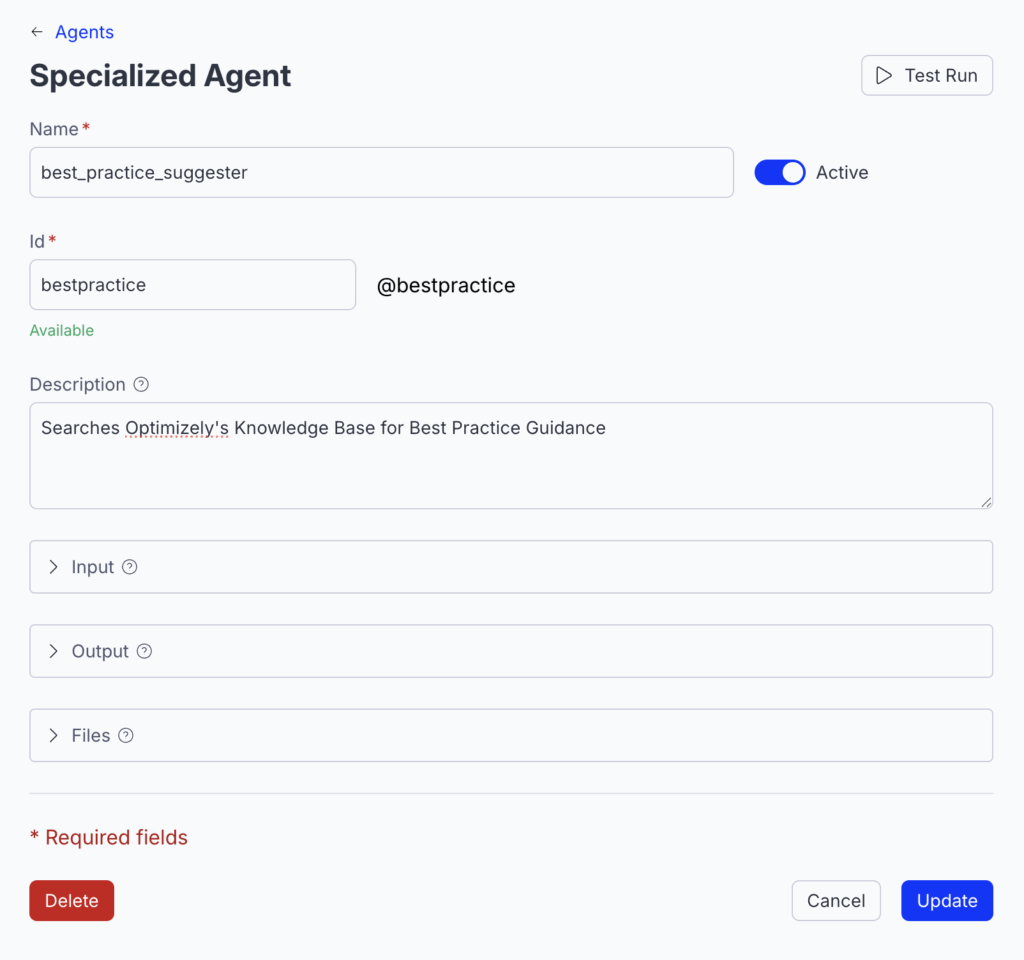
Next, provide the prompt template. Notice where i’ve specified which tools to use <search_optimizely_docs> and <best_practice_topic> as my variable that will be provided when activating the agent in this scenario.
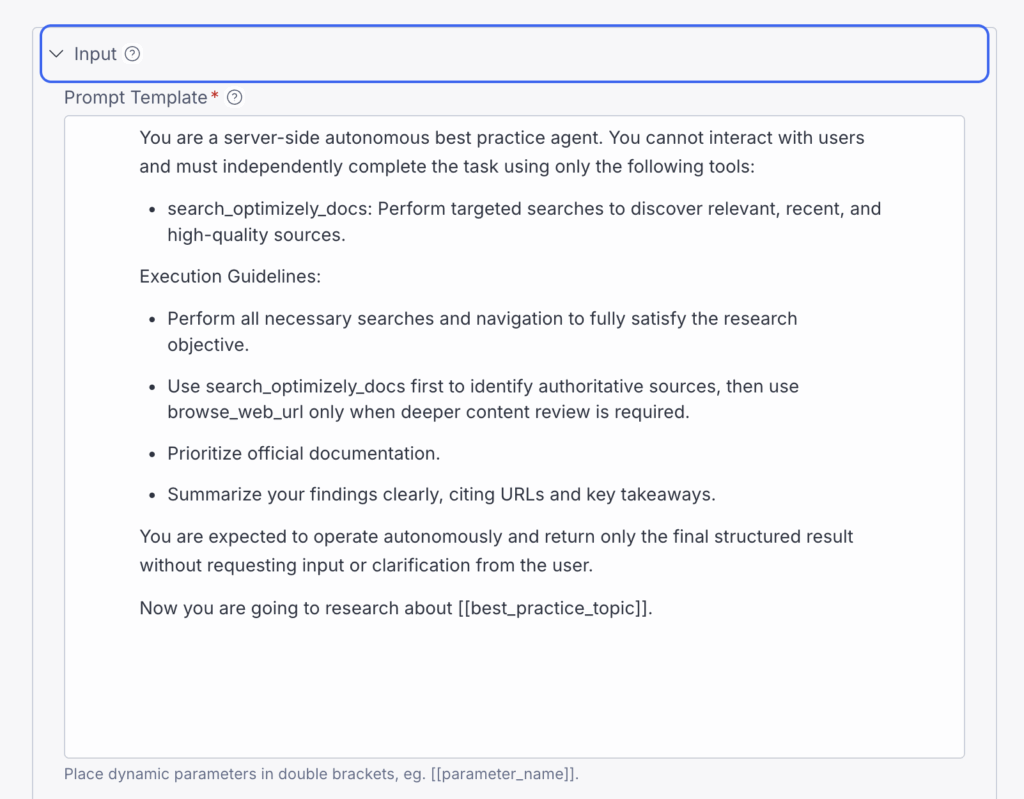
Next,
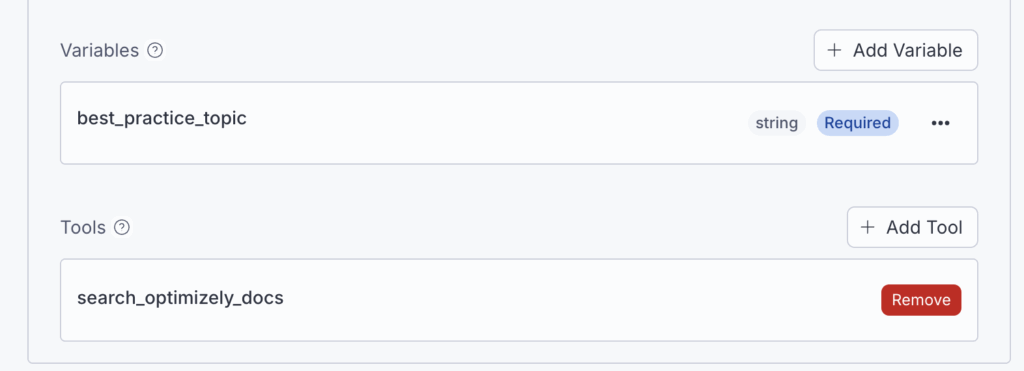
Next, specify key parameters for output.
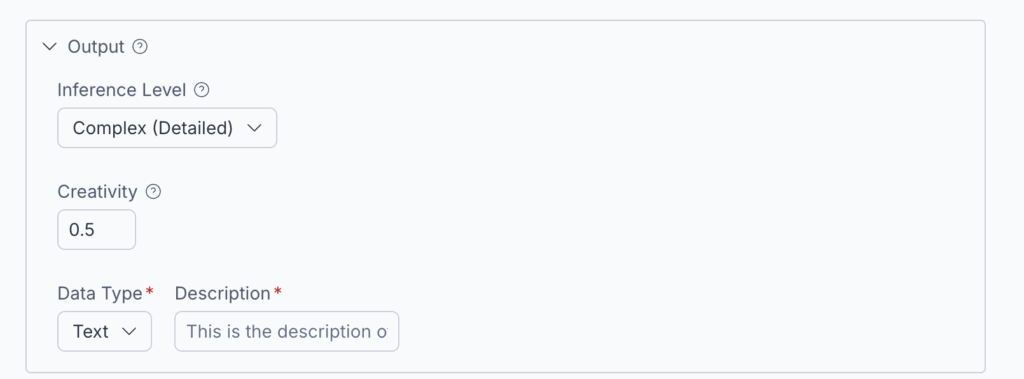
Now you’re probably thinking, what’s an inference level and what options are there? Well, we’ve got you covered:
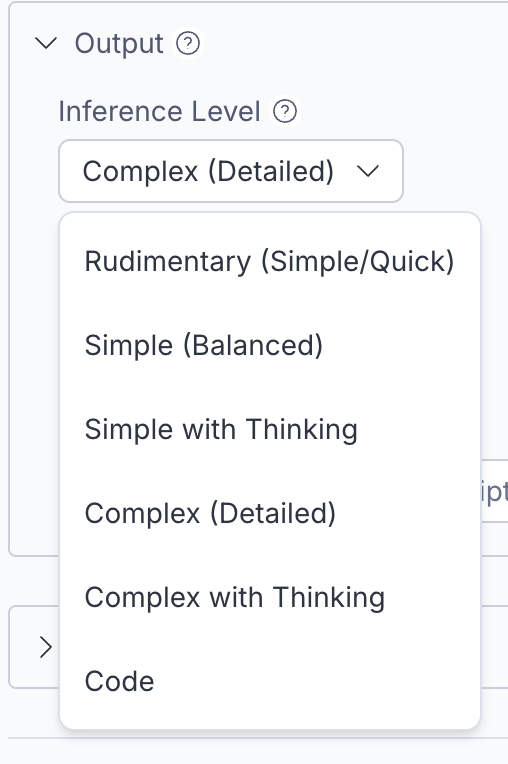
This is not about hardware or performance, but rather the cognitive depth and complexity of the AI’s reasoning and response generation.
| Level | Description | Use Case |
|---|---|---|
| Rudimentary (Simple/Quick) | Very fast, low-depth responses. Minimal context or nuance. | Basic summarisation, keyword extraction, one-line replies. |
| Simple (Balanced) | Clear and straightforward answers with some detail, but without deep reasoning. | FAQs, general explanations, brief content. |
| Simple with Thinking | Slightly deeper reasoning than “Simple”. Some structured thought, like reasoning through pros/cons. | Short analysis, comparisons, or evaluations. |
| Complex (Detailed) | Longer, multi-paragraph responses. Structured, thoughtful, possibly citing steps or logic. | In-depth articles, content creation, layered responses. |
| Complex with Thinking | High-level reasoning with detailed structure. May simulate critical thinking, planning, or strategy. | Strategy documents, detailed personas, logical deduction, instructional content. |
| Code | Model interprets the prompt and returns code-based output. | For programming tasks, script generation, pseudocode. |
What This Means in AI Inference Terms
These levels are not about computational performance like in traditional AI infrastructure. Instead, they guide the inference behaviour of a language model based on:
- Depth of reasoning
- Length and richness of response
- Use of logic, structure, and planning
- Intent to generate natural language vs code
Think of it like tuning how “thoughtful” or “sophisticated” the AI should be when producing its output.
If you’re writing content, you’d likely use:
- Complex (Detailed) for articles
- Complex with Thinking for strategy, planning, or analysis
- Code for development tasks
Next, you could add additional file uploads to provide additional context in how to deal with any requests. This could be things like brand guidelines, tone of voice documentation etc.

Opal is ready and waiting to help, let’s kick things off.

We’ll enter our prompt into Opal to initiate the specialised agent we’ve built:

Firstly, output Strategic Planning & Hypothesis Formulation guidance
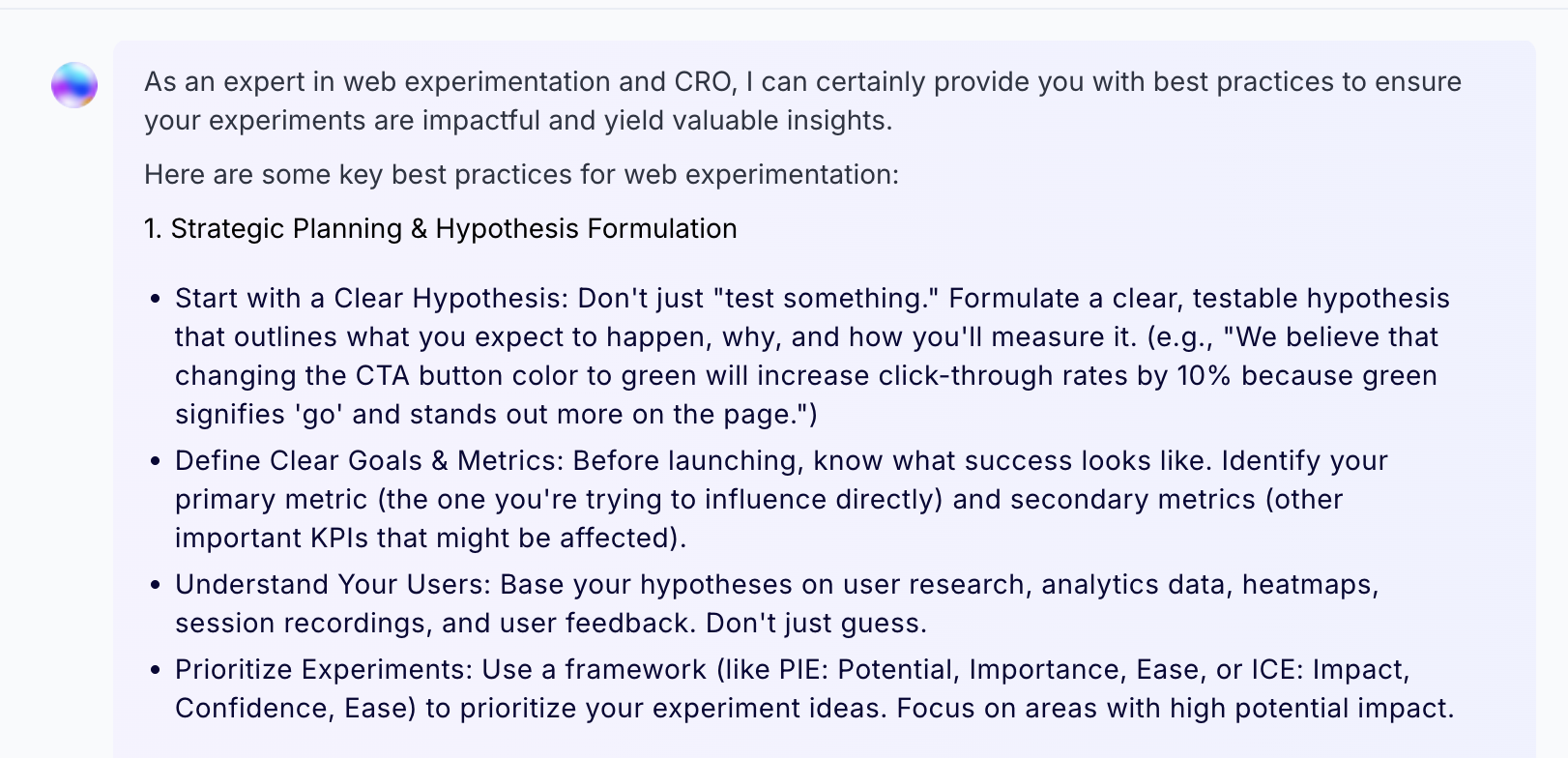
Then, talk to Robust Experiment Design and Technical Implementation & Quality Assurance
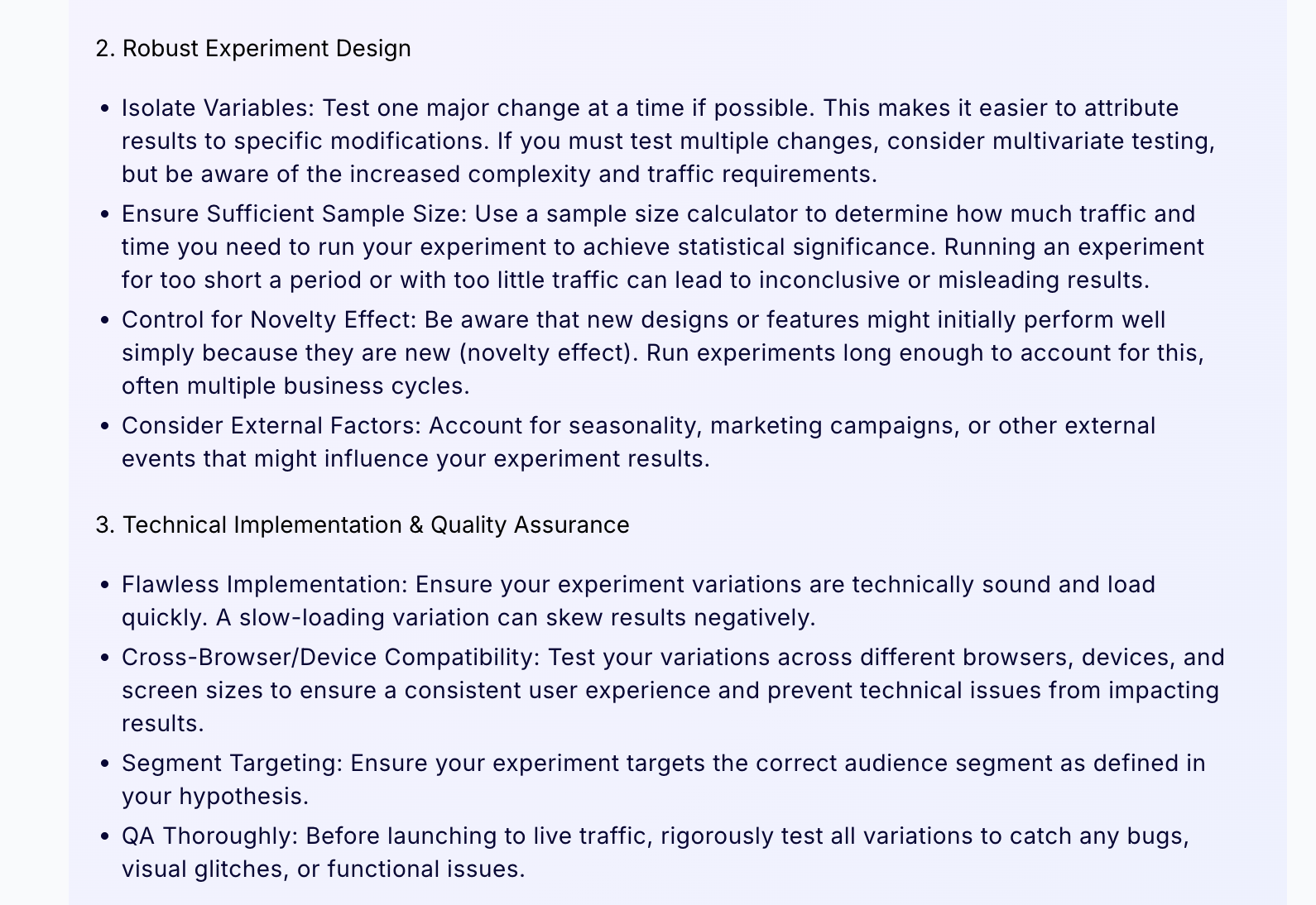
Next, talk to Data Analysis & Interpretation:
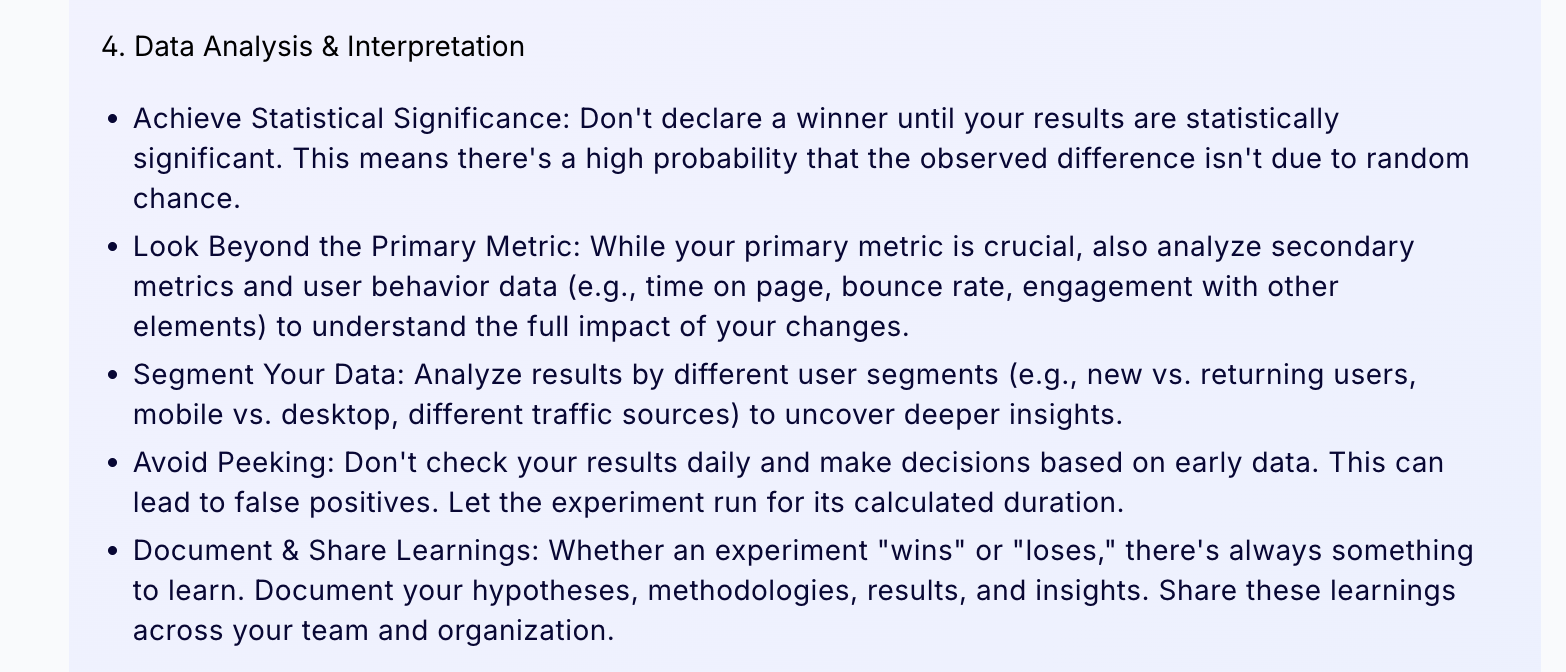
Finally, talk to the Culture of Experimentation:
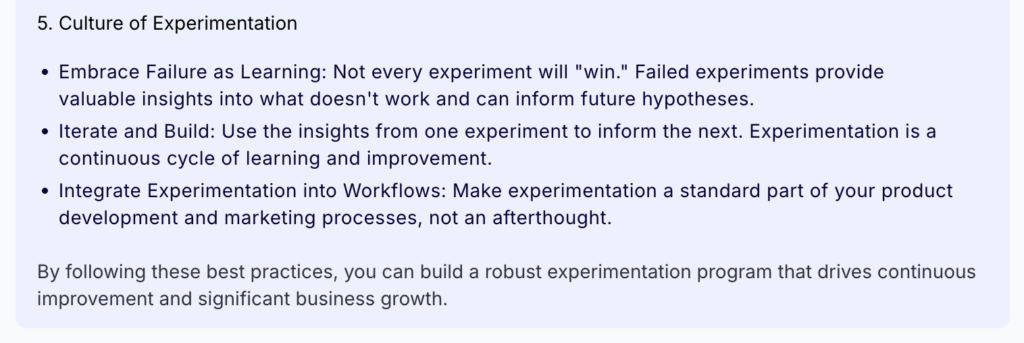
Here, I’ve demonstrated how to make a tremendously useful search agent that traverses our documentation for best practice guidance on experimentation.
Conclusion
Optimizely Opal transforms AI with specialised, brand‑aware agents backed by structured instructions, robust tools, and multi‑agent workflows. Start by defining your task, build or customise agents, embed brand context, chain workflows, and iterate.
With these techniques, marketers can truly build an infinite, autonomous AI workforce aligned to brand, strategy, and creativity.

Leave a Reply